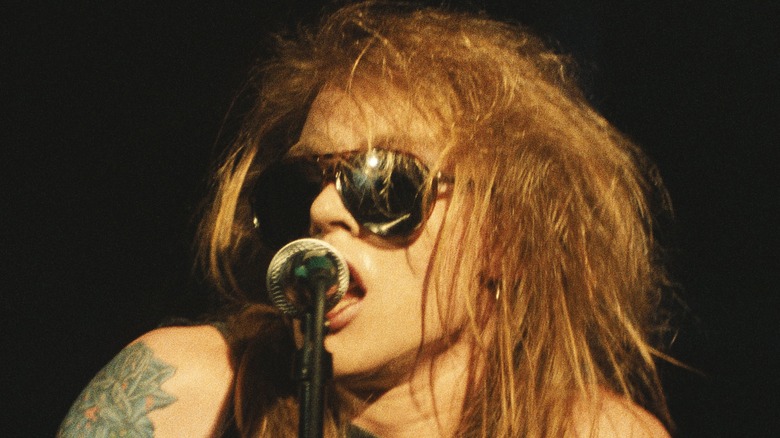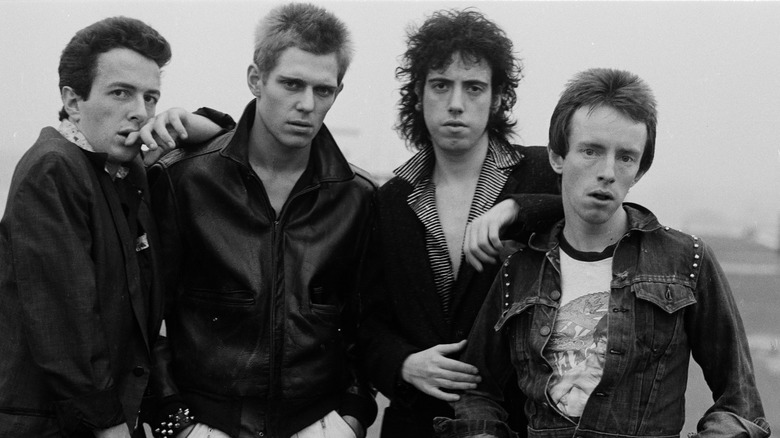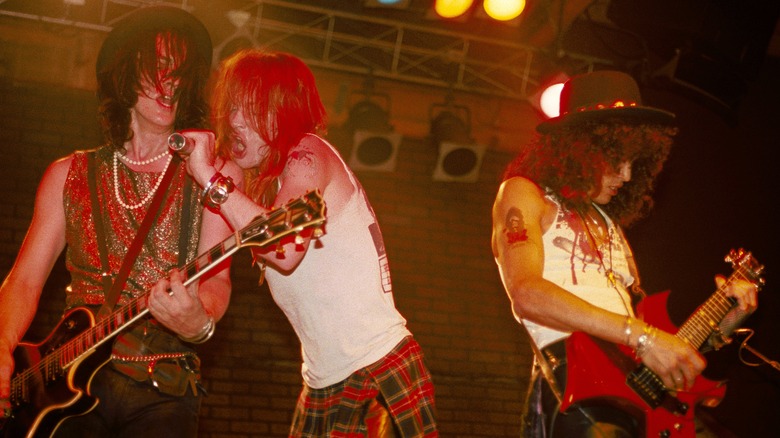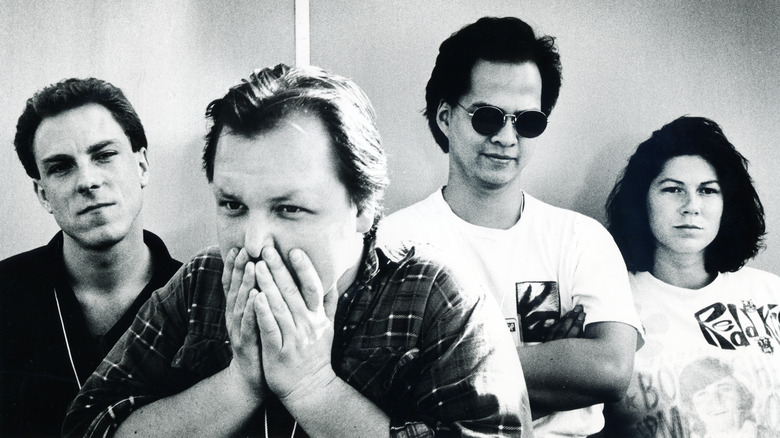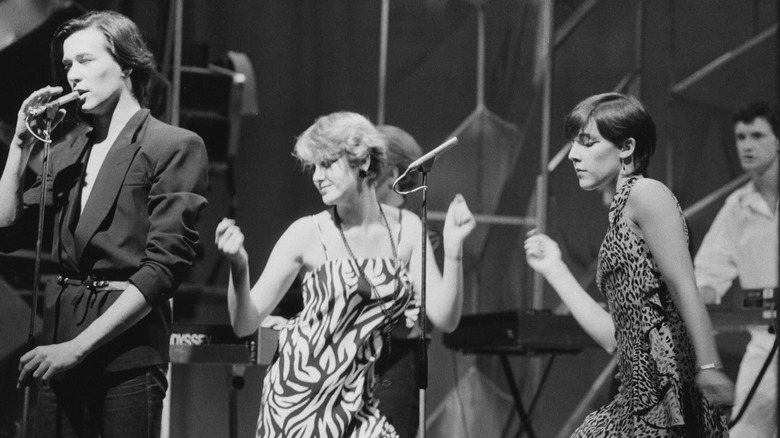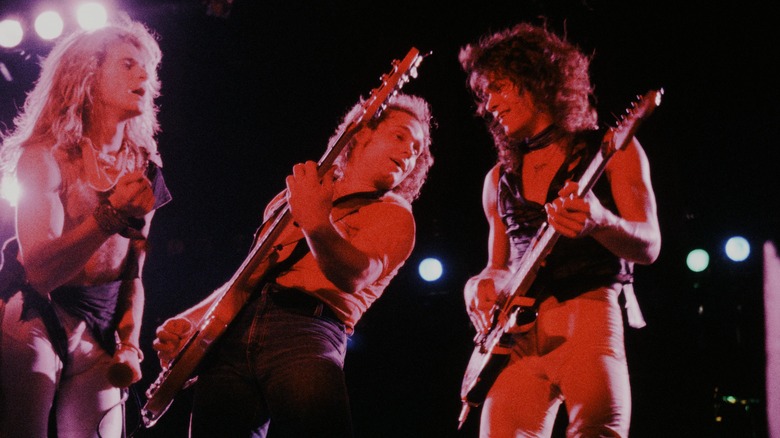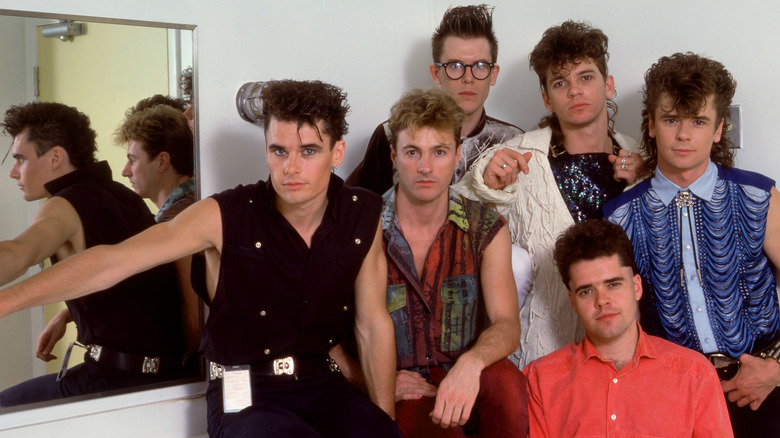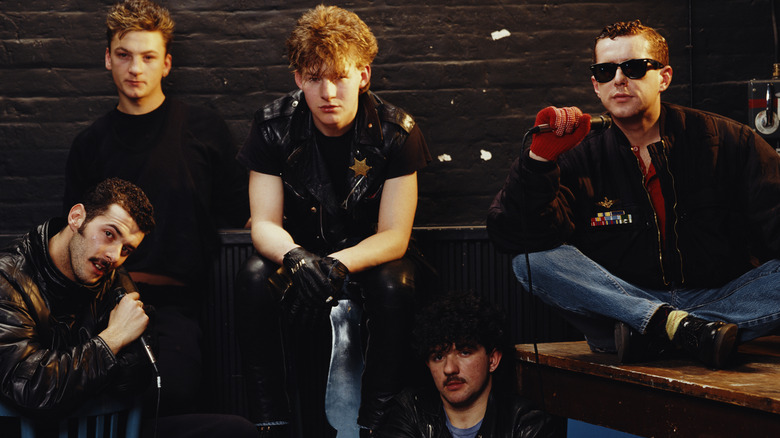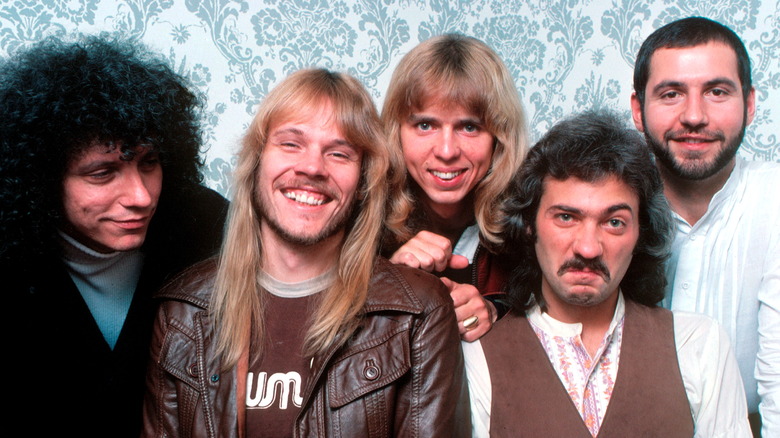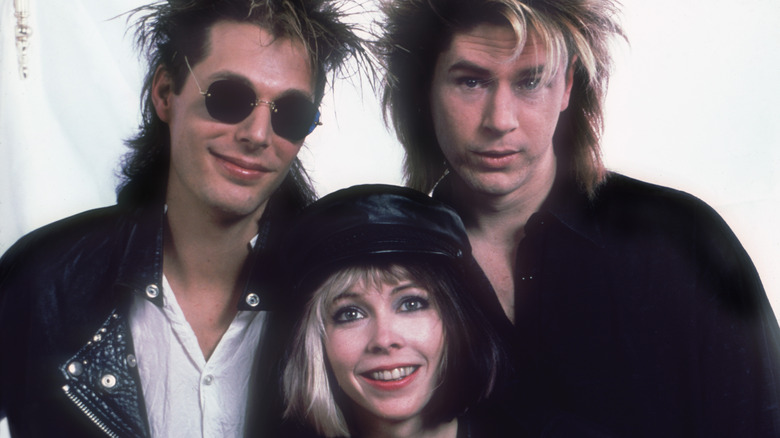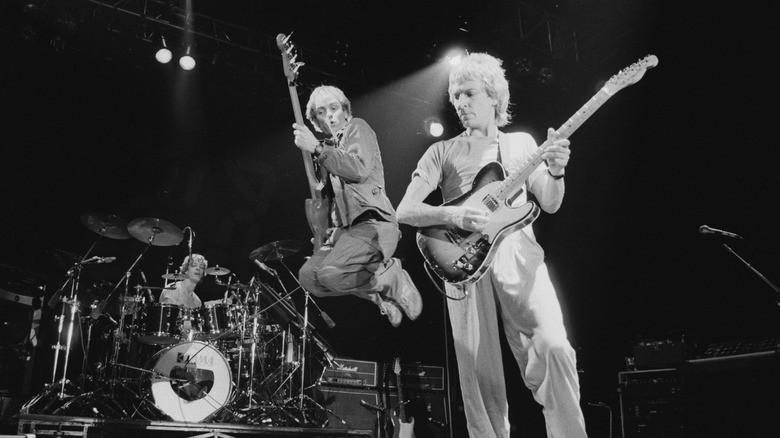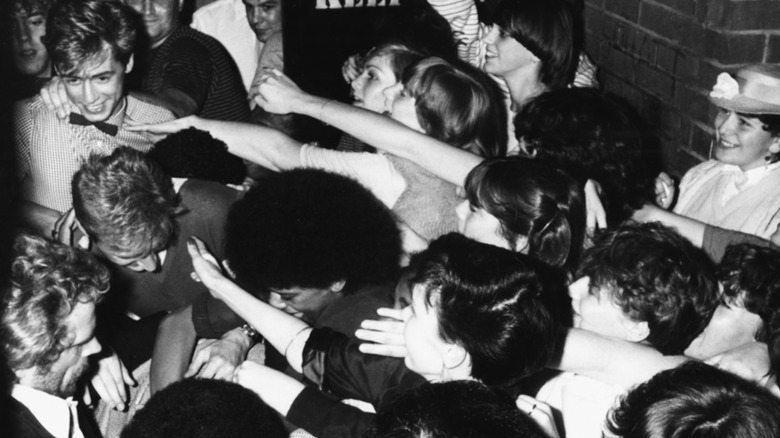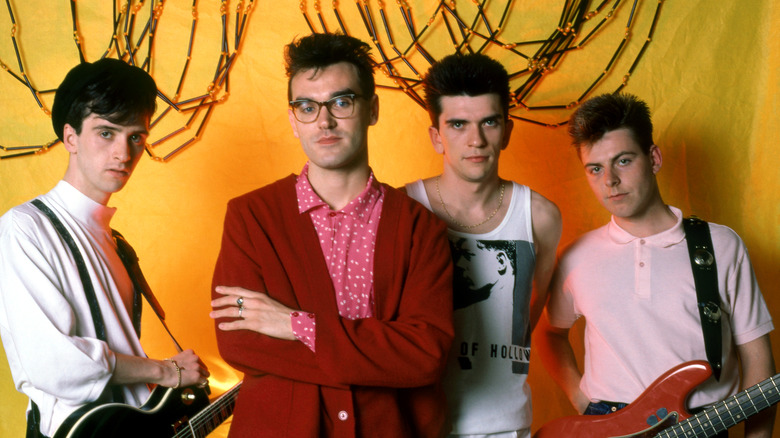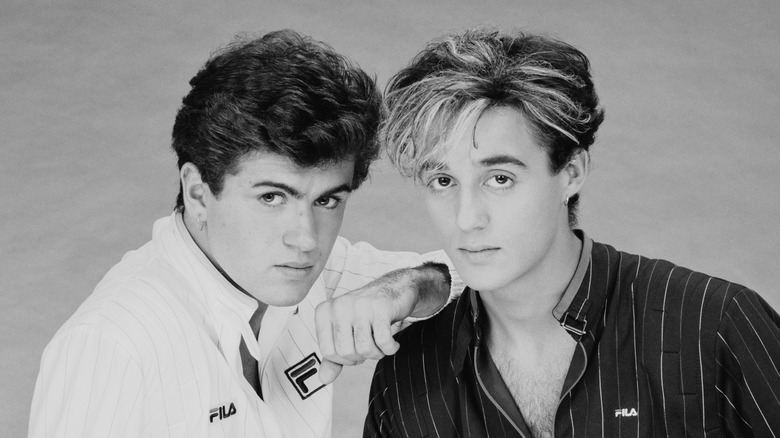The Real Reason These '80s Bands Broke Up
The 1980s was a time of fundamental change in music. As stated by Rolling Stone, "Music videos gave rise to a flashy new class of pop stars." With the rise of MTV, making music videos a quintessential part of what bands did for the first time. Chart-topping songs became a staple of new film soundtracks, and many of the era's biggest movies were packed with pop and new wave hits.
With some of the biggest bands of the era becoming overnight successes, it's not surprising that many split up while trying to cope with the pressures of new fame. Others fell apart due to internal struggles over their creative direction — some ending with spectacularly messy breakups and others slowly fizzling out when key performers dropped out of the band. Some band members reunited years later to bring the fans more music, while others never played together again.
The musicians in these bands came together and made indispensable contributions to music in the '80s — and here's why they broke up.
The Clash
The Clash was a true punk band. Their unpolished look was in direct opposition to the glitz of MTV, they never held back with their political lyrics, and they had the punk rock sound to back it up. From "White Riot" to "London Calling," they achieved mainstream success with a style that was firmly anti-establishment.
In 1985, the band released what would be its final album: "Cut the Crap." As noted by music reviewer Todd in the Shadows, this rarely acknowledged, messy album was influenced heavily by their manager. Two key members of the band were already gone: the drummer, Topper Headon (due to substance abuse issues) and one of the frontmen, Mick Jones. Alongside Joe Strummer, Jones had written and sung many of The Clash's hits. Reasons for Jones' departure vary, but both personality and creative conflicts seem to have driven Jones and Strummer apart.
Parts of "Cut the Crap" are painfully disjointed and "overproduced," despite Strummer's stated desire to strip their sound back to basics. The songs that do sound like what most would think of as a Clash album have "inane" and "forced" lyrics that don't fit with their image as "the thinking man's punks."
After "Cut the Crap," the band fully broke up, and has never reunited.
Guns N' Roses
In 2013, Rolling Stone ranked the breakup of the rock band Guns N' Roses as one of "the 10 messiest band breakups." Like The Clash, their demise was brought on by the exit of key band members.
Only a few years after their massive success with 1987's "Appetite for Destruction," conflicts started between the band members. They "pushed out" drummer Steven Adler due to his drug problems, and the feud between frontman Axl Rose and lead guitarist Slash worsened.
It's difficult to piece together what the exact cause of the split was, as Slash and Duff McKagan describe one version of events which paints Rose as difficult and controlling, and Rose has stated it would be hard to tell his story without "being negative to everybody else and calling them a liar." In an interview quoted by Guns N' Roses Central, Slash explained that Axl Rose's version of events was "every bit as viable" as his own.
Regardless of the exact details of their disagreement, this personality clash forced the band apart in 1993. As reported by NME in 2016, Axl Rose, Slash, and Duff McKagan reunited for a tour after two decades apart. They remain in the current lineup. In August 2021, the band announced a new song titled "ABSUЯD."
The Pixies
Time Magazine describes the Pixies as having "a demented, dreamy surf-punk sound" combined with "irreverent and sometimes morbid lyrics" that were a major influence on 1990s alt rock. Even Kurt Cobain said that their album, "Surfer Rosa," changed his life. However, like many bands, the Pixies got more stressed and fought more the bigger they got.
"We could've survived if we could've just stopped the train and taken a f***ing vacation," lead singer Black Francis is quoted as saying (via NME). As it was, the conflict between band members (like bassist and writer Kim Deal, who felt "pushed out of contributing to songs") pulled them apart.
In 1993, less than ten years after the band was formed, Black Francis announced their breakup on the radio — before telling his bandmates. Reportedly, he called guitarist Joey Santiago after getting off the air but only informed Deal and their drummer David Lovering via fax.
The Human League
Post-punk synthpop group the Human League has been called "one of the most successful New Wave acts of the '80s" and the band that "really kicked off the '80s." Probably best known for their No. 1 hit "Don't You Want Me," their music was extremely influential, encapsulating the sound of the '80s and influencing many artists in following decades (such as Nine Inch Nails' Trent Reznor, as noted by Last.fm).
Despite their many hits in the early '80s, their album "Hysteria" was far less popular. In order to make another album — "Crash" – the label suggested new producers: Jimmy Jam and Terry Lewis. As detailed by Todd in the Shadows' "Trainwreckords" series, the R&B production team, best known for their work with Janet Jackson, and the Human League, was a "fundamental mismatch." After nonstop infighting, the band left their producers to finish the album alone. While the first single still charted at No. 1, an interview with Melody Maker at the time shows the fraught relationship the band had with the album. When lead vocalist Phillip Oakey was asked if he liked the album, he responded: "We took two years to write six songs, and that means, if we hated this LP ... We'd have to put it out anyway."
The Human League did not officially break up and continued to release some songs in the U.K. (with frequent lineup changes,) but they never charted in the United States again.
The Waitresses
The Waitresses were a band invented exclusively for the single "I Know What Boys Like." When it came time to follow it up, they struggled.
As explained by "One Hit Wonderland," songwriter and guitarist Chris Butler came up with the snarky song while working with another band and got his friend Patty Donahue to sing lead vocals. The song charted, but the rest of the album went mostly unnoticed. After touring, Butler and Donahue's relationship became strained, and that was it for the Waitresses.
Despite the difficulty the band had building a career off of "I Know What Boys Like," the band has another song that has ultimately become more popular since their breakup and is probably even better known than their hit single. According to Butler, the label asked them to record a Christmas song, and they "threw together" the song "Christmas Wrapping" as "a toss-off favor" to the label. The upbeat song about an adult's complex relationship with Christmas continues to play on the radio every holiday season.
Van Halen
Van Halen's singer David Lee Roth and guitarist and songwriter Eddie Van Halen had worked together to record chart-topping glam metal rock songs like "Jump" and "Panama," but the two had different goals for the band. As Ultimate Classic Rock explained, Roth "wanted to become even larger than life and even rockier, while [Eddie Van Halen] wanted his band to become as eclectic as possible."
Tensions escalated within the band about the direction they should take the music, forcing members into two clear camps: Van Halen and engineer Donn Landee in one and Roth and producer Ted Templeman in the other. As Van Halen pushed the music more towards his vision for the band, Roth "tried to enforce his personality on the band's videos." Eventually Roth walked out. A few months later, Van Halen declared "the band as you know it is over."
Despite this, Van Halen went on to release a widely panned album titled "Van Halen III," which featured singer Gary Cherone instead of Roth. It featured two guitar solos and a track that Van Halen himself infamously sang on. "Nobody seems to have been steering," UCR editor Matthew Wilkening stated, "There are some cool riffs and ideas, but the concise pop sensibility that helped make the band so special was long gone."
INXS
In 1988, INXS (pronounced like "in excess") reached No. 1 with their single "Need You Tonight," a far more electronic, synth-y track than the New Wave alt band had ever released before. The following album, "Kick," sold more than 10 million copies. According to Billboard, the bad was "regularly in the conversation of ranking the 'biggest bands on the planet'" throughout the late '80s and early '90s.
In 1997, their 37-year-old frontman Michael Hutchence died unexpectedly. The band waited 15 years to officially break up (via NME), but they were never things were never the same without Hutchence.
"We lived for each other in the trenches and we loved each other," founding member Jon Farriss said of the band's end. "It was the six of us against the world and then suddenly and inexplicably we were but five. We were lost right at the moment we were on top."
Frankie Goes to Hollywood
Synth-pop band Frankie Goes to Hollywood topped the charts with their first two singles, "Two Tribes" and "Relax." They were as controversial as they were popular. According to The Guardian, the BBC banned the playing of "Relax" on the radio and the showing of the queer-coded music video on TV. If anything, the controversy helped the band stay on top.
Behind the scenes, there were tensions between the members. According to Past Daily, an actual fight broke out backstage between frontman Holly Johnson and bass player Mark O'Toole. When their second album was less successful, Johnson decided to leave the band.
As detailed by Craig McLean's interview with Holly Johnson, leaving the hit band was harder than it seemed. Rather than let Johnson move on, their label (ZTT) took him to court to try to prevent him from working with a new label. The legal battle took two years, but ultimately the judge sided with Johnson.
Styx
In the 1970s, the band Styx had many soft rock/prog rock hits like "Come Sail Away," but they had also found success with concept albums like "The Grand Illusion" and "Paradise Theatre." According to Ultimate Classic Rock, by the '80s, the public had had enough of concept albums — and even Kiss' popularity took a huge hit after releasing a concept album. The members of Styx agreed that it was time to leave concept albums behind — except for singer, keyboardist, and lead songwriter Dennis DeYoung.
DeYoung pushed an idea for a concept album called "Killroy was Here." While the album, and especially its lead single "Mr. Roboto," did well, the rest of the band didn't like writing songs about robots or having to perform an elaborate performance onstage telling the complex dystopian sci fi story that DeYoung forced them into. As stated by Todd in the Shadows, "the album killed the career of Styx in the most direct way possible: It broke up the band."
Berlin
Berlin was known for singles like "The Metro" and "No More Words" and was tremendously influential in the '80s. Lead singer Terri Nunn stated, "When we started there wasn't anyone else in America making electronic music. It was all punk and power pop."
According to music writer Cameron Adams, their mainstream success was partially due to producer Giorgio Moroder (though the band could only afford him for a single song). In 1986, Moroder recruited Nunn to sing "Take My Breath Away" for the "Top Gun" soundtrack.
The song was an enormous success and made Berlin internationally known. Behind the scenes, there was already tension within the band, but the overnight success pushed them apart. The rest of Berlin resented that their biggest hit was a song they hadn't written. Nunn explained, "We fought about that, then we fought about the fact we had to play it in concerts, John didn't like that either. We were just fighting to fight."
Within a year, the band had broken up.
The Police
The Police released five albums in their first five years, all of which featured songs that would become classics. However, the conflicts between band members were fairly public from the beginning. Their final two albums, "Ghost in the Machine" and "Synchronicity," are often considered their greatest achievements, but behind the scenes, the relationships between frontman Sting, guitarist Andy Summers, and drummer Stewart Copeland became more strained. As stated by Ultimate Classic Rock, "That tension fueled their best work; 'Ghost in the Machine' and 'Synchronicity,' their last two albums, are fraught with separation stories."
As Sting took more and more creative control in The Police, the rest of the band got more and more frustrated. Rolling Stone quotes drummer Stewart Copeland as describing Sting going "berserk" and leaving "everyone in the room white-faced with shock" while recording Ghost in the Machine.
In 1984, the band officially split. They reunited for their induction into the Rock & Roll Hall of Fame and had a reunion tour after the 2007 Grammy Awards.
Haircut 100
Haircut 100 was almost an instant success, becoming international pop stars in their first year and what Music Republic Magazine describes as "an integral part of the 1980s pop explosion." After less than four years, the band broke up.
In an interview with "The Wright Stuff," former frontman Nick Heyward claimed that one source of conflict was that he was making more money than the other members of the band because he was the songwriter. "That was where the tension started with the band," Heyward explained. "That's why we fell apart ... I wasn't the popular guy. I left because I was ganged up on."
On VH1, former bandmates stated that Heyward felt "threatened," that "a master at bringing out your Achilles' heel," and that it was the singer's "mental anguish" that ultimately drove them apart. Ultimately, all the bandmates reunited on, "Band's Reunited," where they played their hits "Love Plus One" and "Fantastic Day" again for the first time since the split. (They would go on to release a live album in 2011.) Hayward went on to release solo albums, support Wham! in their farewell shows, and invest in the '90s rock band Oasis.
The Smiths
The Smiths blended Morrisey's morose, poetic lyrics with Marr's innovative and delicate music. The two intense creative forces within the band created a sound that was incredibly influential. As Simon Hattenstone stated writing for The Guardian, "The band more or less invented indie."
Marr claims that Morrisey was becoming "more and more unreliable" and eventually insisted that they fire yet another manager. After that, Marr was expected to act as the band's unofficial manager, a role he had some experience with, "booking vans and sorting all the finer detail." Simultaneously, he felt he had less creative control than ever. "It's what split the band up," Marr explained, " To this day I haven't met anyone who thinks a major rock group should be managed by the 23-year-old guitar player."
The Smiths attempted to replace Marr after he quit the band, even going so far as to bring another guitarist into the studio, but they were never able to release any new songs.
Wham!
Wham! was a two-man band — George Michael and Andrew Ridgeley. For five years, the pop duo had chart-topping hits like "Careless Whisper" and "Wake Me up Before You Go-Go." They sold around 28 million records, according to Greek City Times.
When the band broke up, the press, fans, and even the label believed it was because the two childhood friends had fallen out. According to Michael, though, that was never the case. Michael has assured fans that there was no bad blood between him and Ridgeley at all, calling it "the most amicable split in pop history."
In truth, Michael had decided it was time to move on from the teen pop songs that had made Wham! a success. He wanted to make "mature" music for adults. Express quotes Michael as saying he wanted to "write to more honest emotions" and create "songs that people could personally relate to."
